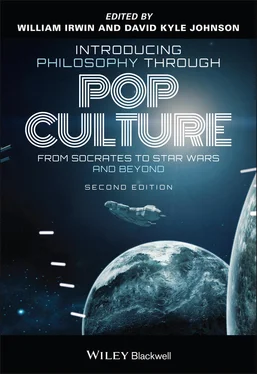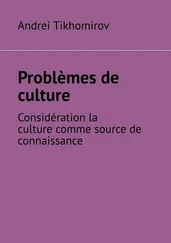9 Dean A. Kowalski, “Astral Bodies and Cartesian Souls: Mind–Body Dualism in Doctor Strange,” from Mark D. White (ed.) Doctor Strange and Philosophy: The Other Book of Forbidden Knowledge (Hoboken: Wiley‐Blackwell, 2018), pp. 101–110. Reprinted by permission of John Wiley & Sons, Inc.
10 Matt Lawrence, “Mind and Body in Zion,” from Matt Lawrence, Like a Splinter in Your Mind: The Philosophy Behind the Matrix Trilogy (Oxford: Wiley‐Blackwell, 2004), pp. 32–46. Reprinted by permission of Blackwell Publishing Ltd.
11 Jason Southworth, “Amnesia, Personal Identity, and the Many Lives of Wolverine,” from Rebecca Housel and Jeremy J. Wisnewski (eds.) X‐Men and Philosophy: Astonishing Insight and Uncanny Argument in the Mutant X‐Verse (Hoboken: Wiley, 2009), pp. 17–26. Reprinted by permission of John Wiley & Sons, Inc.
12 Grant Sterling, “The Consolation of Bilbo: Providence and Free Will in Middle‐Earth” from Gregory Bassham and Eric Bronson (eds.) The Hobbit and Philosophy: For When You've Lost Your Dwarves, Your Wizard, and Your Way (Hoboken: Wiley, 2012), pp. 206–217. Reprinted by permission of John Wiley & Sons, Inc.
13 John R. Fitzpatrick and David Kyle Johnson, “Inception and Free Will: Are they Compatible?” from David Kyle Johnson (ed.) Inception and Philosophy: Because It's Never Just a Dream (Hoboken: Wiley, 2012), pp. 152–165. Reprinted by permission of John Wiley & Sons, Inc.
14 Lucia Carrillo González, “Turing's Dream and Searle's Nightmare in Westworld” from James B. South and Kimberly S. Engels (eds.) Westworld and Philosophy: If You Go Looking for the Truth, Get the Whole Thing (Hoboken: Wiley‐Blackwell, 2018), pp. 73–78. Reprinted by permission of John Wiley & Sons, Inc.
15 Bradley Richards, “What Is It Like to Be a Host?” from James B. South and Kimberly S. Engels (eds.) Westworld and Philosophy: If You Go Looking for the Truth, Get the Whole Thing (Hoboken: Wiley‐Blackwell, 2018), pp. 79–89. Reprinted by permission of John Wiley & Sons, Inc.
16 David Kyle Johnson, “Time Travel in The Avengers.” Reprinted by permission of http://Psychologytoday.com
17 David Kyle Johnson, “Cartmanland and the Problem of Evil,” from Robert Arp (ed.) South Park and Philosophy: You Know, I Learned Something Today (Oxford: Wiley‐Blackwell, 2006), pp. 213–223. Reprinted by permission of Blackwell Publishing Ltd.
18 Robert K. Garcia and Timothy Pickavance, “Hidden Mickeys and the Hiddenness of God,” from Richard B. Davis (ed.) Disney and Philosophy: Truth, Trust, and a Little Bit of Pixie Dust (Hoboken: Wiley‐Blackwell, 2020), pp. 35–44. Reprinted by permission of John Wiley & Sons, Inc.
19 William A. Lindenmuth, “Jedi Knights of Faith: Anakin, Luke, and Søren (Kierkegaard)” from Jason T. Eberl and Kevin S. Decker (eds.) The Ultimate Star Wars and Philosophy: You Must Unlearn What You Have Learned (Oxford: Wiley‐Blackwell, 2016), pp. 31–41. Reprinted by permission of John Wiley & Sons, Inc.
20 Mark D. White, “Why Doesn't Batman Kill the Joker?” from Mark D. White and Robert Arp (eds.) Batman and Philosophy: The Dark Knight of the Soul (Hoboken: Wiley, 2008), pp. 5–16. Reprinted by permission of John Wiley & Sons, Inc.
21 J. Robert Loftis, “Means, Ends, and the Critique of Pure Superheroes,” Mark D. White (ed.) Watchmen and Philosophy: A Rorschach Test (Hoboken: Wiley, 2009), pp. 63–77. Reprinted by permission of John Wiley & Sons, Inc.
22 Eric J. Silverman and Zachary Swanson, “Can Eleanor Really Become a Better Person? (The Good Place)” from Kimberly S. Engels (ed.) The Good Place and Philosophy Everything Is Forking Fine (Hoboken: Wiley, 2021), pp. 37–46. Reprinted by permission of John Wiley & Sons, Inc.
23 Dean A. Kowalski, “You're a Sucky, Sucky Friend”: Seeking Aristotelian Friendship in The Big Bang Theory,” from Dean A. Kowalski (ed.) The Big Bang Theory and Philosophy: Rock, Paper, Scissors, Aristotle, Locke (Hoboken: Wiley, 2012), pp. 21–34. Reprinted by permission of John Wiley & Sons, Inc.
24 Matt Hummel, “You Are Asking Me to Be Rational”: Stoic Philosophy and the Jedi Order,” from Jason T. Eberl and Kevin S. Decker (eds.) The Ultimate Star Wars and Philosophy: You Must Unlearn What You Have Learned (Oxford: Wiley‐Blackwell, 2016), pp. 20–30. Reprinted by permission of John Wiley & Sons, Inc.
25 Arno Bogaerts, “Rediscovering Nietzsche's Űbermensch in Superman as a Heroic Ideal,” from Mark D. White (ed.) Superman and Philosophy: What Would the Man of Steel Do? (Oxford: Wiley‐Blackwell, 2013), pp. 85–100. Reprinted by permission of John Wiley & Sons, Inc.
26 William J. Devlin, “Knowing Who You Are: Existence Precedes Essence in Moana,” from Richard B. Davis (ed.) Disney and Philosophy: Truth, Trust, and a Little Bit of Pixie Dust (Hoboken: Wiley‐Blackwell, 2020), pp. 107–117. Reprinted by permission of John Wiley & Sons, Inc.
27 J. Lenore Wright, “Becoming a (Wonder) Woman: Feminism, Nationalism, and the Ambiguity of Female Identity,” from Jacob M. Held (ed.) Wonder Woman and Philosophy: The Amazonian Mystique (Hoboken: Wiley‐Blackwell, 2017), pp. 5–18. Reprinted by permission of John Wiley & Sons, Inc.
28 George A. Dunn and Nicolas Michaud, “The Silence of Our Mother: Eywa as the Voice of Feminine Care Ethics (Avatar),” from George A. Dunn (ed.) Avatar and Philosophy: Learning to See (Hoboken: Wiley‐Blackwell, 2014), pp. 7–18. Reprinted by permission of John Wiley & Sons, Inc.
29 Jeremy David Bendik‐Keymer, “Everything is Backwards Now”: Avatar, Anthropocentrism, and Relational Reason,” from George A. Dunn (ed.) Avatar and Philosophy: Learning to See (Hoboken: Wiley‐Blackwell, 2014), pp. 115–124. Reprinted by permission of John Wiley & Sons, Inc.
30 Greg Littmann, “Maester Hobbes Goes to King's Landing (Game of Thrones),” from Henry Jacoby (ed.) Game of Thrones and Philosophy: Logic Cuts Deeper Than Swords (Hoboken: Wiley, 2012), pp. 5–18. Reprinted by permission of John Wiley & Sons, Inc.
31 Richard Davies, “Lost's State of Nature,” from Sharon Kaye (ed.) Lost and Philosophy: The Island Has Its Reasons (Oxford: Wiley‐Blackwell, 2007), pp. 177–190. Reprinted by permission of Blackwell Publishing Ltd.
32 Jeff Ewing, “Federation Trekonomics: Marx, the Federation, and the Shift from Necessity to Freedom,” from Kevin S. Decker and Jason T. Eberl (eds.) The Ultimate Star Trek and Philosophy: The Search for Socrates (Oxford: Wiley‐Blackwell, 2016), pp. 115–126. Reprinted by permission of John Wiley & Sons, Inc.
33 Christopher Robichaud, “Superman and Justice,” from Mark D. White (ed.) Superman and Philosophy: What Would the Man of Steel Do? (Oxford: Wiley‐Blackwell, 2013), pp. 61–70. Reprinted by permission of John Wiley & Sons, Inc.
34 Paul A. Cantor, “Cartman Shrugged: South Park and Libertarian Philosophy,” from Robert Arp and Kevin S. Decker (eds.) The Ultimate South Park and Philosophy: Respect My Philosophah! (Oxford: Wiley‐Blackwell, 2013), pp. 177–193. Reprinted by permission of John Wiley & Sons, Inc.
35 Roy T. Cook, “Ninjas, Kobe Bryant, and Yellow Plastic: The LEGO Minifigure and Race,” from Roy T. Cook and Sondra Bacharach (eds.), Lego and Philosophy: Constructing Reality Brick By Brick (Hoboken: Wiley‐Blackwell, 2017), pp. 91–101. Reprinted by permission of John Wiley & Sons, Inc.
36 Timothy E. Brown “When Tech Meets Tradition: How Wakandan Technology Transcends Anti‐Blackness,” from Edwardo Perez and Timothy E. Brown (eds.) Black Panther and Philosophy (Hoboken: Wiley‐Blackwell, forthcoming 2022). Reprinted by permission of John Wiley & Sons, Inc.
37 Bertha Alvarez Manninen, “Black Mirror and Political Manipulation: How Are We Tricked into Dehumanizing Others?” from David Kyle Johnson (ed.) Black Mirror and Philosophy: Dark Reflections (Hoboken: Wiley‐Blackwell, 2020), pp. 118–127. Reprinted by permission of John Wiley & Sons, Inc.
Читать дальше












